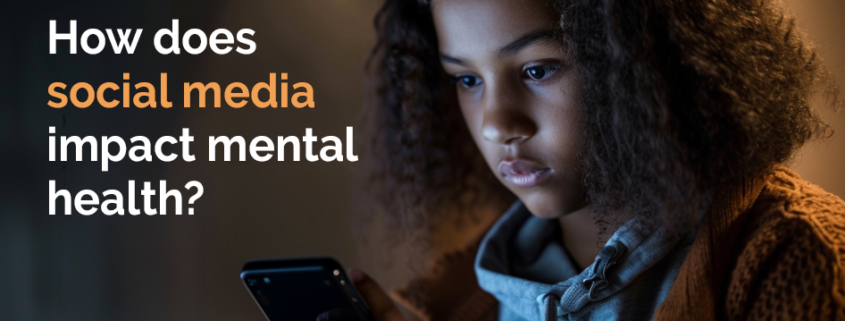Let’s Talk about the Impact of Social Media on Adolescent Mental Health
Online socialization is part of everyday life. Thanks to smartphones, the internet is always just a tap or two away, leading to a drastic increase in the amount of time adolescents and young adults spend online. According to the Pew Research Center, nine in ten U.S. teens use social, with close to half admitting to high levels of screen time.
There’s no two ways about it – social networks impact the mental health of teens and young adults who are constantly online. It’s now a regular part of young people’s lives, so it’s important to understand the real-life consequences when it comes to excessive use of social media (and how to support those who are feeling the effects).
The Impact of Social Media Use on Youth Mental Health
According to the American Psychological Association, social media use isn’t inherently harmful to the mental well-being of adolescents. However, certain social media habits and pre-existing mental health problems can make teens more vulnerable to experiencing mental health issues from using social media platforms. There are several potential negative effects of social media use.
Poor Body Image and Self-Esteem Issues
Constantly seeing idealized images of others’ lives and bodies when scrolling through apps like Instagram, Snapchat, and TikTok can cause vulnerable teens and adolescents to form negative comparisons about themselves and their bodies.
When being exposed to posts from their peers, teens may also develop a fear of missing out (FOMO), which can trigger anxiety issues and lead to excessive social media use. It can also make them more vulnerable to peer pressure.
Cyberbullying and Cyberhate
Cyberbullying certainly contributes to these feelings of low self-esteem. According to the Pew Research Center, over half of U.S. teens have been bullied and harassed online.
Cyberhate, defined as online material with hateful messaging toward particular groups of people, also negatively impacts adolescent health. Adolescents who are part of the targeted groups may face increased chances of social anxiety. Furthermore, those who are not part of the targeted groups are vulnerable to adopting hateful ideas.
Social Media Addiction
Social media use releases dopamine, a feel-good chemical, which can lead to developing social media addictions, especially in teens and adolescents. This constant flood of dopamine doesn’t just lead to excessive screen time; it can also increase depressive symptoms.
Depression and Self-Harm
The negative impact that social media has on young people can cause teens to develop depression or exacerbate pre-existing depression, potentially leading to thoughts of suicide and self-harm.
If you or someone you love is struggling with suicidal thoughts or thoughts of self-harm, it’s important to get help immediately. You can find immediate assistance 24 hours a day by calling or texting the National Suicide and Crisis Lifeline at 988.
Who Social Media Affects the Worst
Social media use impacts young people differently, and some young people may be more vulnerable than others.
The younger someone is when using social media, the more likely it is to impact their mental well-being.
Additionally, according to a systematic review by Alexander Muacevic and John R. Adler, social media use has been shown to impact girls slightly worse than it does boys, leading to an increase in eating disorders among young women.
Teens who regularly use Instagram may be more likely to develop mental health issues. A study from the UK revealed that overall, Instagram has the highest negative impact on young people’s mental health out of all social media platforms.
Young people who already have anxiety disorders or depression are also more vulnerable to the negative effects of social media use. However, data from Pew Research also suggests that online connections may be beneficial for cultivating friendships for those who might have a difficult time making friends at school.
Are There Any Positive Effects of Social Media?
Social media usage isn’t all bad. Social interaction is important to developing a healthy self-image and a fulfilling life. Many adolescents and teens form meaningful social connections online that positively impact their well-being. However, they need to learn how to navigate online spaces responsibly.
How to Help Young People Manage Social Media Use
One of the ways to prevent negative effects is to monitor the social media use of early adolescents. The American Psychological Association recommends that adults monitor the social media use of anyone under the age of 14. Additionally, social media use should be limited so that it doesn’t interfere with young people’s ability to sleep or any physical exercise and in-person social interactions. If you notice a loved one spending an excessive amount of time on social media, talk to them and encourage them to unplug more often.
Exposure to harmful material, such as cyberhate, should be minimized as much as possible (and reported when necessary). It also means talking to the young people in your life about their online activities and teaching them to recognize harmful content and how to disengage with it when they do. Training young people in social media literacy can help reduce the negative impacts it can cause.
You should also regularly check in with any young people in your life who regularly use social media and screen them for any depressive symptoms or self-esteem issues. If you notice that they are starting to develop issues, mental healthcare can lessen the negative impact.
Meridian HealthCare Can Help
How does social media impact mental health in young people? That depends on the individual.
Mental health is a very personal thing, and when a young person is struggling, it can be hard to know how to help them. Licensed mental health professionals can help. Our caring team of therapists is experienced in helping adolescents overcome mental health issues. If you’re seeking support for your child or a loved one, reach out today to schedule an appointment. Together, we can make sure a better tomorrow is possible.





